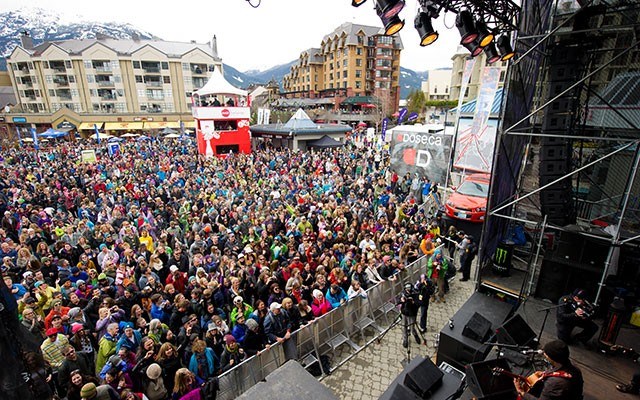It may be time to take a tough look at the economic realities facing Whistler's World Ski and Snowboard Festival and accept facts: Putting on massive free outdoor festivals doesn't add up like it once used to.
So says the behind-the-scenes force of the WSSF, Sue Eckersley, who for years has produced the 10-day end-of-season April bash through her event management company Watermark Communications and who, in more recent years, has been scavenging for a WSSF title sponsor and other sponsors to keep the mainstay iconic event in Whistler alive.
"Events that are coming now have a much more healthy economic model," she said, highlighting mass participation events such as Ironman, Wanderlust and Tough Mudder, which now pepper Whistler's calendar.
They make their money from ticket sales or registration fees; sponsorship dollars are just the gravy, the icing on the cake, she said.
For WSSF, sponsorship is the meat that's feeding the behemoth, a beast that generates economic spinoffs in the community that run into the multi-million dollar range.
And yet, ticket sales account for just 15 per cent of the WSSF's revenues.
"The reality may be that the time may (be) past for events based on the WSSF model. It's a precarious model," said Eckersley.
"We can't keep going on the same vector without the sponsorship dollars coming in. (WSSF) is just too big of a festival, that's free...Now there's a lot more opportunity (for sponsors) to be here, and be connected."
Those opportunities are growing now that the municipality is getting into the game to help supplement its predominately free event program.
According to a request for proposals (RFP), the municipality is looking to recoup up to $225,000 into local government coffers by looking for sponsors for its festivals, events and animation program.
How that could impact local event producers, always on the hunt for money in the tough sponsorship game, is still anyone's guess. In the RFP the municipality outlined its sponsorship assumptions for eight different programs. Most programs, like WSSF are free.
It estimates, for example, GO Festival, the new May long weekend outdoor festival with an on-site audience of 15,000, could attract $30,000 with a title sponsor and two presenting sponsors. Similarly, the Whistler Street Entertainment program, with its reach of 250,000 people, could attract $55,000 in sponsorship.
The Whistler Presents Summer Concert Series is also targeted to get $17,500.
The RFP is looking for someone to develop the sponsorship plan and sell the sponsorship opportunities.
At issue, however, is not just that the municipality will be playing the sponsorship game too, but that it can effectively lowball because, unlike other events, it has taxpayer (or Resort Municipality Initiative, provincial RMI) money to backstop the events. In other words, it doesn't need the sponsorship money to survive.
Eckersley worries that this could create an uneven playing field.
"I hope that the municipality makes sure that its sponsorships are on par with the value they provide to make sure they don't dilute the sponsorship market," added Eckersley, noting that RMI funding has been invested in WSSF as well to expand and enhance the program.
Mayor Nancy Wilhelm-Morden is well aware of these concerns and the potential for conflict. The municipality has been looking at these opportunities, said the mayor, because it wants to reduce the dependency on its provincial RMI funding and see if these predominantly free events can be more self-funding.
"Of course," she said of recognizing these concerns about competition. "We're very cognizant of that. And that's why this whole sponsorship policy that we adopted in October was done on a pilot project basis. We're very sensitive to the issue of other organizations in town looking for sponsorship dollars and that we don't want to be taking opportunities away from those organizations."
The trick to handling that, said John Rae, manager of strategic alliances, in his October report to council, will be "a cooperative sales strategy whereby stakeholders are aware of each other's sponsorship sales strategy and plan..."
Whistler Blackcomb has been in the sponsorship game for years and it has only become increasingly important over that time.
Stuart Rempel, of Whistler Blackcomb, said the company has a number of strategic alliance partners — Telus, Coca-Cola, Labatt, General Motors, Kokanee and Monster to name just a few.
"It's not just about a fee. It's really about: how do we create a partnership between ourselves and our strategic alliance partner that will deliver something special to our customers as well as delivering value to the partners?" he said. "No longer is just a logo on a board or a website sufficient."
There is a team of four at WB that work every day on finding long-term partners.
"It's not an easy marketplace," said Rempel. "There's a lot of sponsorship dollars in Canada. A lot of it goes to hockey... and hockey... and hockey."
Those challenges have been Eckersley's battle these last three years in particular in the wake of the World Ski and Snowboard Festival's long-standing title sponsor contract running out.
The festival has been operating without a title sponsor ever since. But not for lack of trying.
Eckersley muses that the free event model, one that blossomed in Whistler 20 years ago with the dawn of WSSF, when there were virtually no other events in town, no other way for sponsors to get their names here, may need to be re-invented.




